Understanding Infant Iron Requirements
49 hours of research 4 minute read

Iron's role in European baby formula has sparked considerable interest among parents seeking optimal nutrition for their infants. This article delves into the significance of iron, the iron needs of babies, and how European baby formulas address these requirements.
Iron: A Vital Component for Development
Iron is a mineral omnipresent in the environment, from soil and plants to animals and humans. Within the body, it plays a crucial role as a component of hemoglobin, the part of red blood cells responsible for transporting oxygen throughout the body. Hemoglobin's ability to bind with oxygen depends on iron, ensuring oxygen reaches the necessary organs and tissues. Insufficient iron leads to reduced hemoglobin production, resulting in fewer red blood cells and inadequate oxygen supply to organs and tissues. Iron is also essential for the growth and development of the brain and nervous system.
Recognizing Low Iron Levels in Babies
Parents strive for the optimal health of their infants, and a crucial aspect of this endeavor involves monitoring for indicators of low iron levels. Here are potential signs:
- Pale skin
- Fatigue or weakness
- Slow weight gain
- Irritability
- Developmental delays
- Increased infections
If you observe any of these symptoms, it's imperative to consult your pediatrician. They may advise a blood test to assess your baby's iron levels and determine if supplementation is necessary.
Ensuring Adequate Iron Intake for Your Baby
To make sure that your baby receives sufficient iron, incorporating diverse sources of this essential nutrient is crucial in addition to relying on iron-fortified formula. Here are various ways to enhance your baby's iron intake:
- Iron-rich foods: Introduce various iron-rich foods into your baby's diet. Optimal choices include iron-fortified cereals, meat, poultry, fish, and legumes.
- Vitamin C Boost: Enhance iron absorption by including fruits and vegetables rich in vitamin C, such as oranges, strawberries, and broccoli, in your baby's meals.
- Nutrient-Dense Options: Given their small stomach capacity, prioritize nutrient-dense foods that offer maximum benefits in smaller quantities.
It's vital for parents to collaborate with their pediatrician to ensure a well-balanced nutrient intake for their baby and to address any concerns regarding iron levels. Through a thoughtful combination of iron-rich foods and iron-fortified formula, parents can contribute to their baby's overall health, fostering healthy growth and development.
Ensuring Adequate Iron Through Breastfeeding
Breast milk serves as a primary source of nutrition for infants, yet it may not provide sufficient iron for babies beyond approximately six months. While breast milk contains some iron, the quantity is comparatively lower than that found in formula. Although the iron in breast milk is highly absorbable, it becomes crucial to supplement iron through other means as babies' iron requirements intensify with age.
To address this, many parents consider the following:
- Introduction of Iron-rich foods: Begin incorporating iron-rich foods into your baby's diet as they grow. This helps ensure an adequate supply of this essential nutrient.
- Diverse Iron Sources for Breastfeeding Mothers: Breastfeeding mothers can enhance their baby's iron intake by consuming an iron-rich diet, including red meat, leafy green vegetables, and legumes.
It's essential for mothers to adapt to their baby's evolving iron needs and explore complementary iron sources for a well-rounded nutritional approach.
Infant Iron Needs:
The iron needs of babies, as outlined by the World Health Organization (WHO), vary based on their age. Infants aged 0 to 6 months require 0.27 mg of iron daily, while those aged 7 to 12 months need 11 mg of iron daily.
Infant Iron Requirements According to the World Health Organization (WHO):
| Age Group | Daily Iron Requirement |
|---|---|
| 0-6 months | 0.27 mg |
| 7-12 months | 11 mg |
Iron for Exclusively Formula-Fed Babies
For infants exclusively formula-fed, opting for an iron-fortified European baby formula provides the optimal amount of iron and other essential minerals. Although only around 4 percent of the iron in formula is typically absorbed by the baby's intestinal tract, the balanced nutrition in iron-fortified formula caters to the infant's needs. Unless specifically prescribed by a pediatrician, additional iron supplementation is generally not advised by pediatricians.
Top European Formula Picks with Iron
Ensuring your baby gets enough iron is critical for their growth and development. Iron is essential for healthy brain development and the production of hemoglobin, which carries oxygen in the blood. While breast milk is a fantastic source of nutrition, some parents turn to infant formulas to meet their baby's needs. Selecting a high-quality formula can provide the necessary iron and other nutrients to support your baby's health. Here are three top-tier formula options that are loved by parents for their nutritional benefits, including adequate iron content: HiPP Dutch, Holle Goat Dutch, and Kendamil Organic.
✓ 100% Organic formula
✓ Essential nutrients for baby's iron needs
✓ HiPP's most popular formula
Check PricePopular With Parents Because: HiPP Dutch is designed to provide balanced nutrition, including optimal iron levels that support your baby's growth and development. The formula mimics the iron intake from natural breast milk, making it a trusted choice for many parents.
✓ Demeter certified (Organic++)
✓ Gentle goat milk formula with iron
✓ Easy digestion, suitable for allergies
Check PricePopular With Parents Because: Holle Goat Dutch is an excellent alternative for babies with cow's milk sensitivities. Its gentle goat milk formula ensures easy digestibility while providing the necessary iron to support healthy development.
✓ Vegetarian-friendly (Contains Plant-Based DHA and ARA)
✓ EU and British Soil Association Certified Organic
Check PricePopular With Parents Because: Kendamil Organic is beloved by parents for its commitment to wholesome, organic ingredients and sustainable practices. Its gentle formula, free from palm oil and GMOs, also supports healthy iron levels, making it an ideal option for parents as they ensure adequate iron intake for their baby.
Preterm Babies and Iron Intake
Preemie babies may require approximately 2 mg/kg per day, particularly in the initial weeks. Preterm infant formulas often provide additional calories per serving, along with the extra iron needed during this critical period. Neonatologists and pediatricians can recommend the appropriate ratio to meet these early needs.
Combination Feeding
For babies receiving both formula and breast milk, supplementing with iron-fortified formula is not only safe but highly beneficial. Breast milk contains minimal iron, making an extra source of iron in baby formula crucial for balanced nutrition. Iron supplements are often advised for older breast-fed infants without a confirmed diet, and European baby formulas and toddler formulas offer a healthy solution.
Iron-Deficiency Anemia in Children

The most common cause of anemia in babies is insufficient iron. An anemic baby lacks enough red blood cells and hemoglobin, essential for carrying oxygen to cells in the body. Iron is crucial for hemoglobin formation. Parents should discuss their baby's specific iron needs with their healthcare provider, particularly for babies at a higher risk of iron deficiency anemia.
To ensure your baby's well-being, staying attuned to potential signs of iron deficiency anemia is crucial. Keep an eye out for the following symptoms:
- Breathing Problems
- Lethargy
- Weakness
- Heart Dysfunction
- Pale Skin
If any of these indicators are noticed, it's essential to promptly seek medical attention.
Balancing Iron Content in Baby Formulas
While iron is essential, excessive amounts can pose risks, including slower growth, developmental delays, and an increased risk of infection. Concerns exist about excessive iron causing fussiness, colic, and constipation, and for older babies, a potential link with a hyperactive immune system. Achieving the right balance of nutrition in infant formula is crucial, considering all available facts.
Iron in European Baby Formulas
European baby formulas aim to emulate breast milk to fulfill infants' needs in their first year. These formulas are fortified to ensure a balanced combination of nutrients, including iron, promoting healthy growth and development. The dietary iron in European baby formulas collaborates with excess fetal red blood cells present at birth, aiding in the expansion of red blood cell mass and reducing the risk of iron deficiency anemia in infants.
Iron Content in European Formulas

The iron content of European baby formulas has been a topic of concern among parents, prompting discussions about whether these formulas adequately meet the iron needs of infants. Addressing this concern, a study published in the National Library of Medicine thoroughly examined 44 different formulas from 11 European countries.
The findings of the study revealed that European baby formulas not only meet but often exceed the iron content requirements established by the European Food and Safety Authorities (EFSA). The research observed that all formulas contained a minimum of 0.3 milligrams of iron per 100 milliliters, as stipulated by EFSA. Moreover, many formulas surpassed this minimum requirement, with some containing up to 1.2 milligrams of iron per 100 milliliters.
This study affirms that European baby formula provides sufficient iron to fulfill the daily needs of European infants. Emphasizing the importance of iron-fortified formula, especially for non-breastfed infants or those lacking adequate iron from other dietary sources, the research underscores the adherence of European formulas to stringent iron content guidelines set by the European Union.
European baby formulas adhere to specific nutritional requirements differentiating between 0–6 months and 6–12 months. Expressed per 100 kJ and 100 calories of formula, iron levels range from 0.50-1.0 mg. Lower amounts in Stage PRE and Stage 1 cater to infants with high iron reserves, minimizing the risk of iron-deficiency anemia.
Converting EU nutritional requirements to align with other countries' standards reaffirms that European baby formulas meet all EU guidelines and the minimal iron recommendation by the World Health Organization.
Comparative Iron Content in European Formulas
| HiPP Formulas | Iron Content (mg per 100 calories) |
|---|---|
| HiPP German Stage Pre | 0.5 |
| HiPP German Stage 1 | 0.6 |
| HiPP German Stage 2 | 1 |
| HiPP German Stage 2 - No Starch | 1 |
| HiPP German Stage 3 | 1 |
| HiPP Dutch Stage 1 | 0.5 |
| HiPP Dutch Stage 2 | 1 |
| HiPP Dutch Stage 3 | 0.9 |
| HiPP UK Stage 1 | 0.5 |
| HiPP UK Stage 2 | 1 |
| HiPP UK Stage 3 | 1 |
| HiPP Comfort | 0.6 |
| HiPP Anti-Reflux | 0.7 |
| HiPP HA Stage Pre | 0.5 |
| HiPP HA Stage 1 | 0.5 |
| HiPP HA Stage 2 | 0.6 |
| HiPP HA Stage Pre | 1.0 |
| HiPP Kindermilch 1+ | 1.0 |
| HiPP Kindermilch 2+ | 0.7 |
| HiPP Dutch Goat 1 | 0.5 |
| HiPP Dutch Goat 2 | 1.0 |
| HiPP Dutch Goat 3 | 0.9 |
| Kendamil Formulas | Iron Content (mg per 100 calories) |
|---|---|
| Kendamil Organic Stage 1 | 0.7 |
| Kendamil Organic Stage 2 | 0.75 |
| Kendamil Organic Stage 3 | 0.96 |
| Kendamil Goat Stage 1 | 0.7 |
| Kendamil Goat Stage 2 | 0.81 |
| Kendamil Goat Stage 3 | 1 |
| Kendamil Classic Stage 1 | 0.7 |
| Kendamil Classic Stage 2 | 0.79 |
| Kendamil Classic Stage 3 | 1 |
| Lebenswert Formulas | Iron Content (mg per 100 calories) |
|---|---|
| Lebenswert Stage 1 | 0.59 |
| Lebenswert Stage 2 | 0.96 |
| Lebenswert Stage 3 | 0.91 |
| Nannycare Formulas | Iron Content (mg per 100 calories) |
|---|---|
| Nannycare Stage 1 | 0.65 |
| Nannycare Stage 2 | 0.89 |
| Nannycare Stage 3 | 0.99 |
| Kabrita Formulas | Iron Content (mg per 100 calories) |
|---|---|
| Kabrita Goat Stage 1 | 0.5 |
| Kabrita Goat Stage 2 | 0.5 |
| Kabrita Goat Stage 3 | 0.5 |
Understanding infant iron requirements and securing essential nutrients for your baby's healthy growth is paramount. Research indicates that European Formula generally provides sufficient iron for a baby's needs. However, collaborating with a pediatrician is crucial to ensure your baby receives the proper nutrient balance, including iron, to promote their overall well-being. Recognizing the significance of offering optimal nutrition, we present a range of premium organic baby formulas enriched with vital nutrients, including iron. Our curated selection includes formulas from reputable brands committed to quality and safety. As fellow parents, we understand the profound importance of providing your baby with the best foundation for a healthy life, and we're here to assist you in your feeding journey.
Top European Formula Picks with Iron
Organic Life Start is committed to providing accurate, reliable, and trustworthy information to parents and caregivers. We carefully choose credible sources and follow a meticulous fact-checking process to uphold the highest standards in infant nutrition and parenting advice. To learn more about our dedication to accuracy, please explore our editorial guidelines.
Link To Sources


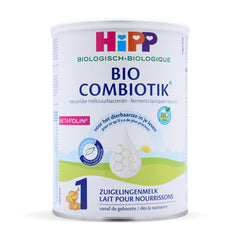
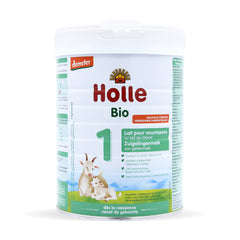
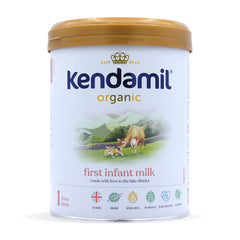
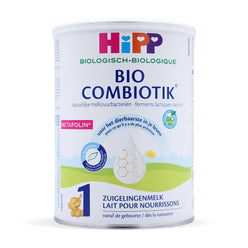
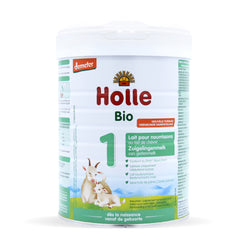
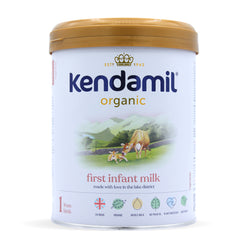
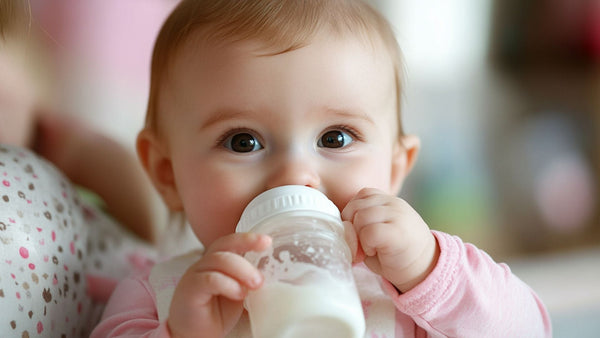


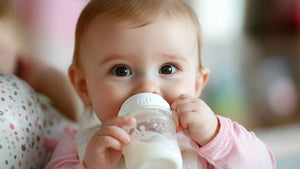


Damon R. -
I was very careful about the iron content of Blue’s bottles since I knew how much iron babies need. To avoid making assumptions or guesses, I compared formulas and looked at the labels. Realizing that the iron content of Kendamil was identical to that of Blue made the decision easy and comforting. Ever since then, he has maintained a healthy growth rate while being active and positive. It gives me peace of mind to know that his food is balanced. In my mind, picking Kendamil was the best way to ensure he had a healthy upbringing.
Mallory Havens -
December 26, 2025
Understanding infant iron requirements is essential because iron supports healthy brain development, oxygen transport, and overall growth during the first year of life. Babies are born with iron stores that usually last about the first six months, after which dietary iron becomes increasingly important. The type of iron matters, as iron from breast milk and iron-fortified formula is highly absorbable compared to many solid foods. Too little iron can lead to iron deficiency and affect cognitive development, while too much iron may cause digestive discomfort for some infants. Knowing when to introduce iron-rich foods or choose an iron-appropriate formula helps parents make informed, balanced nutrition decisions for their baby.
Tinsley C. -
December 11, 2025
Finding out just how much iron Raden needs has been a top priority for me. Now that I know how much iron my baby requires to have everyday, I love that Kendamil Organic already has the right mix. Knowing that he’s eating enough for healthy growth without going overboard gives me peace of mind. Seeing his consistent growth in strength and activity level lifts my spirits. It confirms my belief that we were right to make that decision. Knowing that I’m giving it my all for him makes me happy.